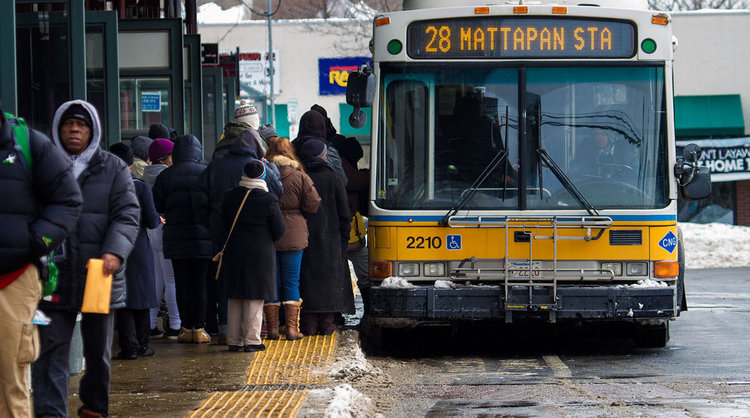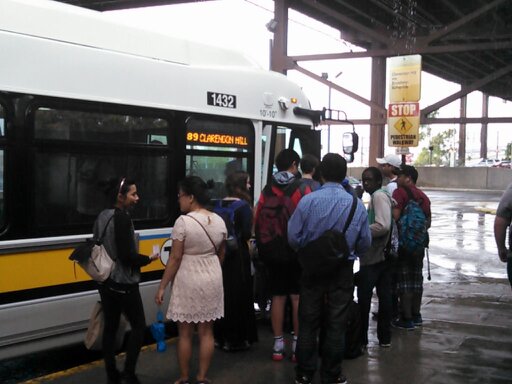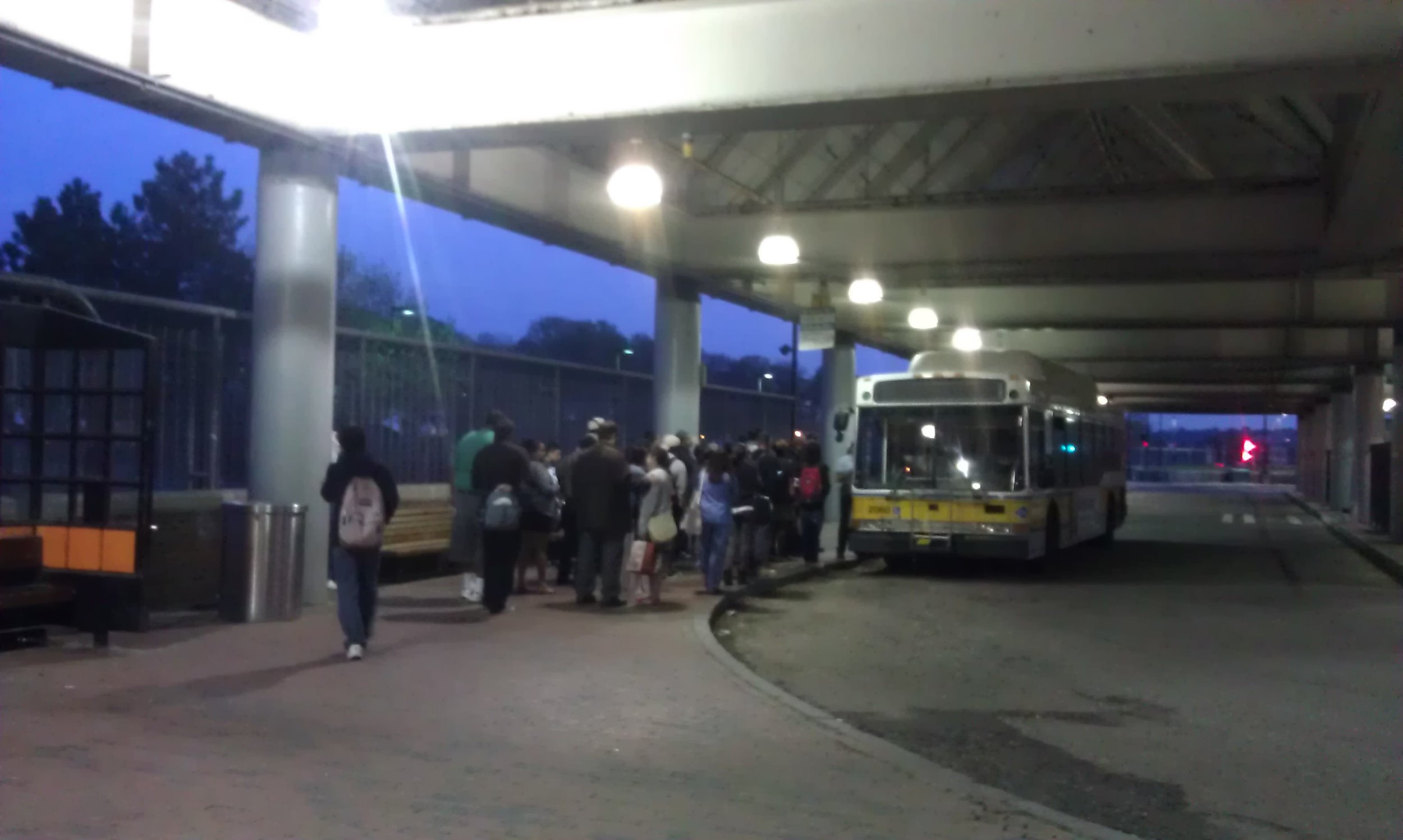Boston’s MBTA has been relying increasingly on shuttle buses so it can shut down portions of subway lines for repairs. I am not convinced that these shutdowns are actually necessary or useful, and they are certainly a miserable experience for riders. Are we trying to reduce ridership and encourage driving? With service like this, it seems so. Here’s a piece I wrote in CommonWealth Magazine.
Shuttle buses not cutting it during recent subway shutdowns
TWO WEEKENDS AGO the MBTA did something previously unthinkable. It closed half of a major subway line, through downtown Boston, on a game day, with shuttle buses running from Back Bay to Sullivan. There was little notice and even less planning for running the buses that would shuttle people through dense Boston traffic, turning a 20-minute train ride into a miserable one-hour ordeal.
Each time an Orange Line train carrying 200 passengers unloaded at Sullivan Station, riders slowly packed into buses, each painfully inching through traffic and making every stop while exiting and boarding riders jostled to get on and off. There were no dedicated lanes for buses, no traffic officers, no signal adjustments, and no enforcement to keep cars from stopping wherever they felt like (but the flashers must make it okay). Multiple buses with 70 passengers each had to wait behind a handful of cars.
Instead of multiple express and limited-stop route options, there was only one route and its design made little sense. Stops were hard to find, inaccessible to riders with disabilities, or located far from the stations they were allegedly serving. The northbound Downtown Crossing stop was located at least a quarter mile away at 100 Federal Street. I spoke to several riders who missed their stop because of either the bizarre route, poor information, a language barrier, or the lack of audible announcements on shuttle buses. These riders are the “essential workers” the T needs to be especially responsive to as it builds back from the pandemic.
The experience was particularly confusing and arduous for riders transferring from commuter rail at North Station. The only indication that subway service was not provided was in the form of two small, hard-to-read signs near the subway entrance and the main entrance. No personnel were located inside the commuter rail station to direct passengers along the unintuitive route to the shuttle bus, a one-third-mile walk from the commuter rail platforms to an unmarked fire hydrant on North Washington Street, instead of a more intuitive location along Causeway Street near the subway entrance – or the equally confusing spot where Lechmere shuttles have been boarding for the past two years. Compounding the problem was the poor weather conditions that weekend. At a time when commuter rail ridership remains low, such failures to coordinate services frustrate riders and drive them away.
At one point on Saturday evening, thousands of Bruins fans stood on the sidewalk on North Washington Street, eventually cramming onto arriving buses, most without masks for the slow crawl across the temporary Charlestown Bridge. North Washington Street itself has a red bus lane but it was full of cars (as usual). Since no one thought to temporarily prohibit parking on that block, buses stopped in the travel lane to load, causing further delays to the buses behind.
At Sullivan, there were no signs showing the shuttle route or any other useful information. Most regular route buses stopped in different places so that the shuttle could stop upstairs, but there was only one sign indicating this, located all the way at the end of the platform where nobody would see it. Not a single bit of information was in Spanish or any of the other languages commonly spoken in Malden, Everett, and Somerville, although to be fair there was not much in English either.
The MBTA is now gearing up for another year of “diversions” – shutting down a different section of track each weekend and sometimes on weekday evenings – and early indications are not encouraging. This week the T quietly posted in a web site alert that the busiest part of the Blue Line would shut down for two weeks – less than two weeks from now. The Blue Line has been the subway line with the highest ridership during the pandemic, and closing it on short notice for an extended period without a comprehensive, legible alternative for riders is unfathomable.
So far this year there have been shuttles on the Red Line north of Harvard and between Broadway and JFK/UMass. The Orange Line will have shuttles again this weekend. Over the past year, there have been numerous Red and Orange Line shutdowns, as well as two Green Line branches that closed every weekend for six months and another that was closed every day for two months, all with similarly poor execution. These shuttle operations continue despite a severe operator shortage that prompted service cuts and shows no sign of easing. And yet the subway lately has been slower than biking, and the Green Line B branch is still slower than walking. You can see for yourself on the TransitMatters Data Dashboard.
The T says maintenance needs to be done and, yes, essential maintenance activities that cannot take place during normal subway operations are fully appropriate and necessary. The question is: Why can’t maintenance be done overnight like it always has until recently? According to the T, weekend shutdowns are better and cheaper than having a station open but under construction, or having trains go slowly through a work zone, for a much longer period. But has anyone asked T riders if this approach is better, or considered how it harms and deters riders and increases driving? MassDOT would never consider shutting down the I-93 tunnel for even one day, but this is exactly what the T is doing with the Orange Line, and riders have no alternatives.
There may have been a time when the rare summer weekend subway shutdown was acceptable because ridership and car traffic were much lighter, so shuttles could be fast and frequent and some people would choose to walk. If that was ever true, it is no longer. In many parts of the city, traffic is worse on Saturday afternoons than at any other time. Sending packed shuttle buses through the Theater District on a Saturday evening or to Quincy on a Sunday afternoon isn’t a painless experience.
Apologizing for the “inconvenience” and suggesting riders “allow extra travel time” shows a failure to understand and appreciate the impact these disruptions cause. Every time a low-wage worker is surprised by a poorly communicated disruption and delayed by 45 minutes, they risk losing a job and/or 45 minutes of pay. Many people simply miss out on social, educational, or recreational opportunities because it simply takes too long. Meanwhile the T’s own attendance policy imposes “progressive discipline” for bus and subway operators who show up even 30 seconds late to work, but apparently it’s okay to delay others and they won’t even tell you how late you’ll be.
If these subway shutdowns are really absolutely necessary, the MBTA must plan, communicate, and operate replacement services that keep disruption to an absolute minimum. This would include, at a minimum, working with the relevant cities and state agencies to create temporary bus lanes, adjust or turn off traffic signals, and use police officers at intersections to keep buses moving.
Multiple shuttle routes, including express and limited-stop options, would make the experience more tolerable and be more efficient anyway. Alternative routes should offer extra service that’s free and which riders are encouraged to use, such as the Green Line and commuter rail lines that parallel much of the Orange Line and parts of others. Shuttle buses can also be more creative, such as bringing passengers from Ruggles direct to downtown, and not just mirroring the subway line. Shuttle buses should operate on bus-only streets to maintain reasonably fast and reliable service.
The plan must also be communicated to riders well in advance, both online and in person. Periodic announcements in stations is not enough. Riders become creatures of habit and may walk by several signs before noticing one. Large eye-catching signs with links and QR codes are needed in multiple languages in every station and every train car on the affected line, as well as key stations on other lines, including commuter rail and buses. Generic signs warning riders of regular weekend shutdowns and advising them to check the website each week should be placed on every bus and train and in every station. Then on the day of the event, directional signage should be everywhere. The T should also adopt a communication plan for disruptions of all types and familiarize riders with how to stay informed, in any language.
This would all take some planning and coordination but it’s not impossible or unreasonable. It would also make the city and the T think long and hard about whether rail shutdowns are really necessary, because, if they are, they’ll have to do more than simply throw shuttle buses on the streets. It would also be an opportunity for municipal leaders in Boston and Cambridge to demonstrate how well they can support improving shuttle services initiated by the T, in a way where city resources are deployed to enable more efficient and convenient shuttle services and serve as a model for regular routes.
Jeremy Mendelson is a transit service planner, bus operator, and co-founder of TransitMatters.







